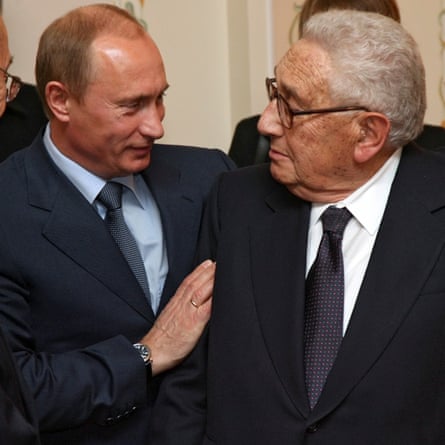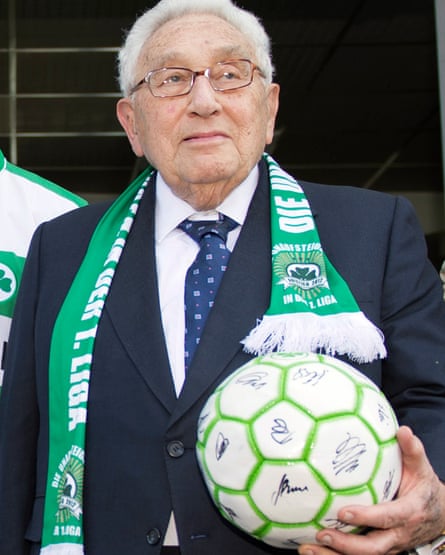‘A towering figure’: world leaders pay tribute to Henry Kissinger
World leaders have offered condolences and praise for Henry Kissinger, a former US secretary of state, who died on Wednesday at the age of 100, as his death elicited sharply divided responses over his legacy.
Kissinger shared the 1973 Nobel peace prize for his role in negotiating an end to the Vietnam war but his foreign policy efforts in support of US interests were controversial, and his involvement in foreign conflicts and in overthrowing democratically elected governments around the world saw him branded by opponents as a war criminal.
A Rolling Stone magazine headline said: “Henry Kissinger, war criminal beloved by America’s ruling class, finally dies.”
The Russian president, Vladimir Putin, said Kissinger was a “wise and talented statesman”.
“I had the opportunity to personally communicate with this deep, extraordinary man many times, and I will undoubtedly retain the fondest memory of him,” Putin wrote in a telegram to Kissinger’s widow. The text was posted to the Kremlin’s website.

“The name of Henry Kissinger is inextricably linked with a pragmatic foreign policy line, which at one time made it possible to achieve detente in international tensions and reach the most important Soviet-American agreements that contributed to the strengthening of global security,” Putin said.
China hailed Kissinger as an “old friend”. Kissinger was central to the US’s decision to switch diplomatic relations from Taipei to Beijing in the 1970s, recognising the communist People’s Republic on the mainland rather than the government in exile on Taiwan as the legitimate power. Kissinger visited China more than 100 times, most recently in July, when he held talks with President Xi Jinping.
“It is a tremendous loss for both our countries and the world,” the Chinese ambassador to the US, Xie Feng, said in a post on the social media platform X.
“History will remember what the centenarian had contributed to China-US relations, and he will always remain alive in the hearts of the Chinese people as a most valued old friend,” he added.
After leaving office, Kissinger grew wealthy advising businesses on China, and had warned against a hawkish turn in US policy. Chinese officials have struggled in recent years to hide their nostalgia for the days of rapprochement under Kissinger.
In a lengthy obituary on Thursday, Beijing’s state broadcaster CCTV hailed his “historic contribution to the opening of the door to US-China relations”. Kissinger, it said, was “an important witness who experienced the establishment of diplomatic relations between China and the United States and the development of the relationship between the two countries”.

A hashtag on the social media platform Weibo had about 770,000 views, with the discussion highly complimentary. “Epic diplomat, I hope the US-China relationship gets better and better,” said one comment.
“Commemorating Mr Kissinger, the greatest secretary of state in the history of the United States. Mr Kissinger, an old friend of the Chinese people, at the age of 100, passed away peacefully at his home,” said another.
However, in Taiwan some people called his death “good news”, citing his involvement in starting the rush of nations to switch ties to Beijing. “Bless him for being Chinese in his next life,” one said.
Foreign ministry officials in Taipei described Kissinger as a “towering figure in the history of American diplomacy”, while the opposition Kuomintang party, which ruled the island as a Chinese government-in-exile at the time of the US switch, offered its condolences to his family.
“We recognise Kissinger’s efforts to bring about peace and prosperity in the Indo Pacific throughout his career in and outside government,” it said in a tweet, prompting incredulity and scorn from some users.
“He takes away your UNSC seat and you mourn his death. That’s … a choice,” said one.
In Japan, the prime minister, Fumio Kishida, hailed Kissinger’s “significant contributions” to peace and stability in Asia. In the 1970s Kissinger referred to the Japanese as “treacherous sons of bitches” for wanting normal relations with China when he was national security adviser to Nixon, according to documents declassified in 2006.
Kissinger “made significant contributions to the regional peace and stability, including the normalisation of diplomatic ties between the US and China”, Kishida told reporters. “I’d like to express my most sincere respect to the great achievements he made,” Kishida added. “I also would like to offer my condolences.”
The German chancellor, Olaf Scholz, said that with the death of the German-born Kissinger, who retained his Bavarian accent, the world had lost “a great diplomat”.

“His commitment to the transatlantic friendship between the USA and Germany was significant, and he always remained close to his German homeland.”
The former British prime minister Tony Blair said he was “in awe” of Kissinger.
The Israeli president, Isaac Herzog, paid tribute to Kissinger’s role in laying the groundwork for the historic 1979 peace deal with Egypt. He said the diplomat “laid the cornerstone of the peace agreement, which was later signed with Egypt, and so many other processes around the world I admire”.
The Israeli prime minister, Benjamin Netanyahu, who is under pressure to end military activity that has killed tens of thousands in Gaza, launched after Hamas’s attack on southern Israel on 7 October, said he had met Kissinger on many occasions, describing them as lessons in diplomacy and statesmanship. “His understanding of the complexities of international relations and his unique insights into the challenges facing our world were unparalleled,” he said.
Italy’s prime minister, Giorgia Meloni, described Henry Kissinger as a stalwart of strategic politics and world diplomacy, saying: “It has been a privilege to have recently engaged with him on various issues on the international agenda. His passing saddens us, and I express my personal condolences, as well as those of the Italian government, to his family and loved ones.”
The Italian foreign minister, Antonio Tajani, wrote on X: “I want to remember Kissinger, Nobel Peace prize laureate, as a friend of Italy and a staunch supporter of transatlantic relations. A pillar of diplomacy, the younger generation will learn from his writings the art of dialogue and negotiation, always striving for the benefit of global equilibrium.”